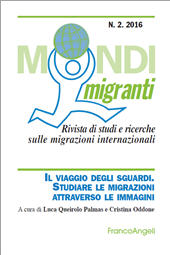Cicli migratori sud-sud : l'esperienza dei migranti di ritorno Maliani
179-200 p.
South-South migration: the case of the Malian returnees.
La migrazione di ritorno che ha luogo nell'ambito di flussi migratori sud-sud è generalmente poco trattata nella letteratura, ma rappresenta un fenomeno diffuso a livello globale (UN, 2013), che spesso ha profonde radici storiche. Il contesto sub-sahariano più in generale l'Africa occidentale preso in esame in questo saggio, ne è un esempio. È una regione caratterizzate da una alta mobilità geografica delle persone e da una marcata natura circolare delle traiettorie migratorie sia interne che internazionali. La migrazione di ritorno, così come la costruzione di legami transnazionali, sono pratiche assai diffuse. Il paese preso in esame in questo saggio è il Mali e l'analisi si basa su interviste strutturate a 350 migranti di ritorno maliani realizzate nel 2012 nel quadro di una più ampia ricerca cross-country condotta nell'ambito del Return migration and Development Platform (Rdp) presso l'Istituto Universitario Europeo. Le informazioni sulle esperienze migratorie raccolte attraverso interviste strutturate co
n i migranti di ritorno, hanno consentito di ricostruire le condizioni, le motivazioni e le scelte degli intervistati nelle tre fasi del ciclo migratorio: prima di partire, durante il soggiorno all'estero e dopo il ritorno nel paese di origine. Questo saggio si focalizza sui cambiamenti avvenuti durante il ciclo migratorio nell'ambito della famiglia e del lavoro, due dimensioni che hanno avuto un ruolo centrale nello strutturare il progetto migratorio degli intervistati. Il saggio è strutturato in sei sezioni. La prima fornisce alcuni elementi di contesto utili per l'interpretazione dei risultati della ricerca. Nella seconda sezione si forniscono alcune note metodologiche. La terza sezione illustra le caratteristiche principali dei cicli migratori degli intervistati; le due sezioni successive si focalizzano sull'evoluzione della situazione familiare e lavorativa nelle tre fasi del ciclo migratorio. Infine si offrono alcune riflessioni conclusive. [Testo dell'editore].
The return migration in the context of South-South migration is underresearched but is widespread (UN, 2013) and has historical roots. The context of Sub-Saharan Africa and more in general West Africa is a case in point. This region is historically characterized by a high mobility of people and the circularity of migration trajectories, both internal and international. Within this framework, the return migration is a common practice among migrants and is part and parcel of the development of transnational ties. The country surveyed in this essay is Mali and the analysis is based on structured interviews with 350 Malian returnees carried out in 2012 as part of a wider cross-country research conducted by the Return migration and Development Platform (Rdp) at the European University Institute. The information gathered through the interviews allowed conditions, motivations and choices of returnees across the three stages of the migration cycle - i.e. before emigrating, abroad and after the return - to be reconstr
ucted. In particular this article focuses on the changes occurred during the migration cycle concerning the family and work situation, two dimensions that turned out to be central in structuring the respondents' migration projects. The article is structured into six sections. The first two sections provide information about the context and the research methodology. The third section describes the general features of the respondents' migratory cycles. The next two sections focus on the evolution of the family and work situation across the three stages of the migration cycle. Some conclusive remarks are provided in the last section. [Publisher's Text].
Fa parte di
Mondi migranti : 2, 2016-
Articoli dello stesso fascicolo (disponibili singolarmente)
-
Informazioni
Codice DOI: 10.3280/MM2016-002009
ISSN: 1972-4896
PAROLE CHIAVE
- Migranti di ritorno, Mali, ciclo migratorio, famiglia, lavoro, reinserimento
- Return Migrants, Mali, migration cycle, family, work, reintegration



